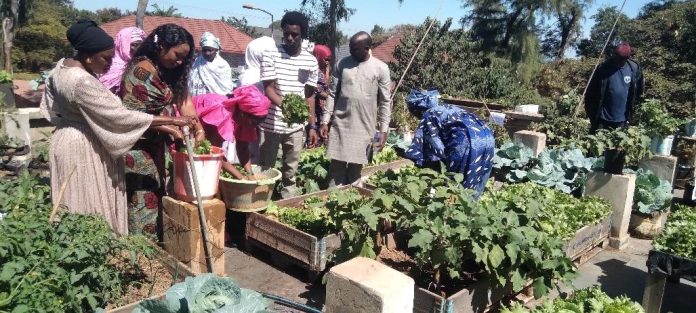By Kebba AF Touray
The Urban Agriculture Directorate organised the 2025 farmer field day on micro-gardening in urban areas on Monday, 20 January 2025.
The initiative of micro-gardening aligns with the national pathways for food system transformation, in support of the 2030 agenda for sustainable development.
Micro-gardening is a practice that uses what people think is waste such as spoiled tires and produces healthy products without any resultant effect on the environment.
Papia Badgie, the Director of the Urban Agriculture Directorate said “Today marks a key milestone in our collective drive for the attainment of key national, regional and global development priorities”.
She highlighted that micro-gardening has huge potential, within the urban municipalities of KMC and BCC.
“Since access to land is becoming increasingly difficult for residents within the urban agricultural directorate, we want to harness the potential of micro-gardening, to improve food security and nutrition, as well as promote employment creation,” said Badgie.
She expressed hope that with more investment in micro-gardening, the region can contribute immensely towards ensuring inclusive, resilient, and sustainable economic growth, which remains one of the priorities of the Gambia Government.
Sira Drammeh, on behalf of Bakau Women Farmers, expressed joy to the Agriculture Ministry, especially the Urban Directorate, for the numerous supports they continue to receive from the sector.
She reported, “We were crying for water in our garden, but thanks to the FAO through the Directorate, the problem of water is now history”.
Drammeh appealed for them to be provided with lands so that they can maximize their production, adding that a huge number of women are interested in venturing into horticultural production, but the lack of adequate land is frustrating their aspirations.
The produce, she said, is what they sell to feed their families, pay tuition fees for their children, as well as contribute their quota towards the fight against hunger in the country.
“Empower us with lands to do our gardening, because there are countless women who want to venture into horticulture production, but are challenged with lack of land,” she appealed.
Modou Sowe, Project Director of Gambia Agriculture and Food Security Project (GAFSP) explained that micro-gardening was born out of the discussions between him and the urban directorate as to what they should do as far as urban agriculture is concerned.
He said that from their discussions, they resolved to look into innovative partnerships, which gave rise to the concept of micro-gardening.
GAFSP, he said, is supporting micro-gardening which focuses on food and nutrition security, and household incomes.
He reported: “We have so far reached 20 thousand beneficiaries (70 percent of whom are women), beyond that feeding 55 thousand school-going children every day in the country. Micro-gardening allows income for urban households and also contributes to micronutrients, as it provides immediate access to vegetables”.
Musa Humma, Director General of the Department of Agriculture, said that there is a lot of poverty, unemployment, and migration in the urban area, “so setting up of the Urban Agriculture Directorate to cover KMC and BCC is the right thing in the right direction”.
Abdoulie Danso, rep of SWEGAM CEO, said: “It is a laudable achievement that we have something of this nature established. It shows and amplifies the potentials of agriculture which should not necessarily be limited to the rural areas especially when it comes to horticultural activities”.
He urged stakeholders to promote urban agriculture to cater to the needs of society.
Deputy Mayor of KMC, Binta Janneh Jallow, said that women in the Greater Banjul Area, have virtually lost all their farmlands to housing and industrialization, contributing to the vicious cycle of intergenerational poverty, within the GBA.
She said, “Despite the challenges, we still have many active farmers, especially women and youth farmers (around the majority) who are engaged in the horticulture value chain as a source of livelihood”.
KMC, she said, attaches huge importance to agriculture, which is clearly manifested by the series of initiatives that they have undertaken through their agricultural unit.
Minister for Agriculture, Demba Sabally, said that 50 percent of the population is faced with poverty, unemployment, food and nutrition insecurity, irregular migration, environmental degradation and waste management amongst others.
“Micro-gardening is highly productive and can be easily managed by anyone. Virtually, you can grow your vegetables without space and soil,” he said.
“The initiative is out to effectively place sub-Saharan Africa as a hub for green cities approaches as well serve as food and nutrition security strategy”, added Minister Sabally.



















